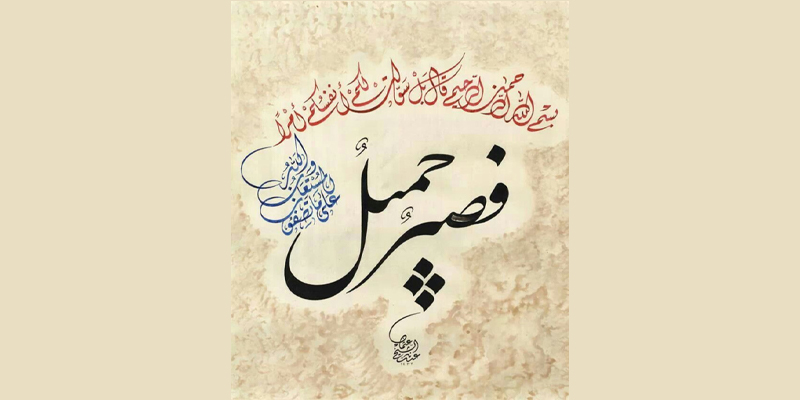
Surah Yusuf, Chapter 12 of the Qur’an, is the most engaging, timeless and a complete story ever. It was relevant back then and it is relevant today.
Prophet Yusuf (عَلَيْهِ ٱلسَّلَامُ), known for his miraculously good looks, was beautiful both inside out. The real impact of this Surah is how it helps beautify relationships and teaches invaluable lessons in times of difficulty and ease. Often people advise pregnant women to recite it to have a beautiful baby. This tradition is not proven by any verse of the Qur’an or hadith. This is certainly not what the Surah is meant to be used for.
The Qur’an itself calls the true story of Prophet (Yusuf) “the best of stories”. In the beginning of Surah Yusuf, Allah (عَزَّوَجَلَّ) says:
نَحْنُ نَقُصُّ عَلَيْكَ أَحْسَنَ الْقَصَصِ
“We relate to you, [O Muhammad], the best of stories…”
[Surah Yusuf:3]
It is the story of the life of Yusuf (عَلَيْهِ ٱلسَّلَامُ). Here are a few reflections on this Surah:
- There are disadvantages of announcing your plans and showing off blessings – the evil eye (Nazr-e-Bad) and jealousy haunts behind. Do not share plans till they materialize. For example: initial pregnancy, intent to marry someone or the initial job interview that went well. Don’t also announce good dreams. Yaqub (عَلَيْهِ ٱلسَّلَامُ) advised his sons:
قَالَ يَا بُنَيَّ لَا تَقْصُصْ رُؤْيَاكَ عَلَىٰ إِخْوَتِكَ فَيَكِيدُوا لَكَ كَيْدًا ۖ إِنَّ الشَّيْطَانَ لِلْإِنسَانِ عَدُوٌّ مُّبِينٌ ﴿٥﴾۔
“He said, “O my son, do not relate your vision to your brothers or they will contrive against you a plan. Indeed Satan, to man, is a manifest enemy.”
[Surah Yusuf: 5]
- There are three elements of sabrun jameel (beautiful patience): Don’t announce your suffering all the time. Don’t complain to everyone. And don’t imply that you are perfect and free of faults.
فَصَبْرٌ جَمِيلٌ
“So patience is most fitting…”
[Surah Yusuf: 18]
- Maturity does not come without having gone through difficult times. Tough times have a way of making us stronger and hopefully wiser.
وَكَذَٰلِكَ مَكَّنَّا لِيُوسُفَ فِي الْأَرْضِ وَلِنُعَلِّمَهُ مِن تَأْوِيلِ الْأَحَادِيثِ ۚ وَاللَّـهُ غَالِبٌ عَلَىٰ أَمْرِهِ وَلَـٰكِنَّ أَكْثَرَ النَّاسِ لَا يَعْلَمُونَ ﴿٢١﴾۔
“And thus, We established Joseph in the land that We might teach him the interpretation of events. And Allah is predominant over His affair, but most of the people do not know.”
[Surah Yusuf: 21]
- The credit goes to Allah (عَزَّوَجَلَّ) if we do something good and are able to ward off a temptation. The biggest temptation is narcissism and vanity.
كَذَٰلِكَ لِنَصْرِفَ عَنْهُ السُّوءَ وَالْفَحْشَاءَ ۚ إِنَّهُ مِنْ عِبَادِنَا الْمُخْلَصِينَ ﴿٢٤﴾۔
“And thus [it was] that We should avert from him evil and immorality. Indeed, he was of Our chosen servants.”
[Surah Yusuf: 24]
- People don’t listen to our tableegh (preaching) if we have not developed a relationship with them. See the example of Yusuf (عَلَيْهِ ٱلسَّلَامُ). He had built a bond with the other inmates in jail. That is why they listened to him. Point: Work on relationships with sincerity.
- Effects of your a’amaal (deeds), whether they are good or bad, reflect on your face. In a world where you have to keep marketing yourself, humility becomes difficult. But it is important for tazkiyah (purification) of the nafs (self) to not announce your achievements all the time. However, undue humility can hamper you getting the deserved position. Therefore, maintain a balance. Tell when necessary and offer your services where needed. Undue modesty will stop you from doing the duty Allah (عَزَّوَجَلَّ) assigned you. Be like Yousuf (عَلَيْهِ ٱلسَّلَامُ) – humble yet confident and giving Allah (عَزَّوَجَلَّ) credit for everything good.
Reflection of Qualities of Yusuf (عَلَيْهِ ٱلسَّلَامُ)
- To be a Muhsin (one with a beautiful attitude and nature).
- Sabr (patience) is inevitable. A reactive, inflammable personality cannot be a muhsin.
وَكَذَٰلِكَ مَكَّنَّا لِيُوسُفَ فِي الْأَرْضِ يَتَبَوَّأُ مِنْهَا حَيْثُ يَشَاءُ ۚ نُصِيبُ بِرَحْمَتِنَا مَن نَّشَاءُ ۖ وَلَا نُضِيعُ أَجْرَ الْمُحْسِنِينَ ﴿٥٦﴾۔
“And thus We established Joseph in the land to settle therein wherever he willed. We touch with Our mercy whom We will, and We do not allow to be lost the reward of those who do good.”
[Surah Yusuf: 26]
- In the era of Facebook and Instagram where we share every joy and share every plan with hundreds, we need to remind ourselves that nazar-e-bad [evil eye] is a reality. Safeguard yourself against it with prayers, especially the last 2 chapters of the Qur’an. Also do not announce your plans and every achievement and joy. Yaqub (عَلَيْهِ ٱلسَّلَامُ) advised his sons:
وَقَالَ يَا بَنِيَّ لَا تَدْخُلُوا مِن بَابٍ وَاحِدٍ وَادْخُلُوا مِنْ أَبْوَابٍ مُّتَفَرِّقَةٍ ۖ وَمَا أُغْنِي عَنكُم مِّنَ اللَّـهِ مِن شَيْءٍ ۖ إِنِ الْحُكْمُ إِلَّا لِلَّـهِ ۖ عَلَيْهِ تَوَكَّلْتُ ۖ وَعَلَيْهِ فَلْيَتَوَكَّلِ الْمُتَوَكِّلُونَ ﴿٦٧﴾۔
“And he said, “O my sons, do not enter from one gate but enter from different gates; and I cannot avail you against [the decree of] Allah at all. The decision is only for Allah; upon Him I have relied, and upon Him let those who would rely [indeed] rely.”
[Surah Yusuf: 67]
- “Do not grieve yourself over what they did” – Beautiful advice Yusuf (عَلَيْهِ ٱلسَّلَامُ) gave to his brother Bin Yameen. Reminder to self: Stop focusing on the few people who are a test for us and bother/hurt us. Instead, focus on those who are the coolness of your eyes, and are good to you. Ramadan is the best time to let go of this baggage of “I am hurt by him/her”.
فَلَا تَبْتَئِسْ بِمَا كَانُوا يَعْمَلُونَ ﴿٦٩﴾۔
“…so do not despair over what they used to do [to me].”
[Surah Yusuf: 69]
- There is always someone who is better than you even in the things that you are good at. And the most Knowing and Perfect is Allah (عَزَّوَجَلَّ). So stay humble. You are not the ultimate. Never.
نَرْفَعُ دَرَجَاتٍ مَّن نَّشَاءُ ۗ وَفَوْقَ كُلِّ ذِي عِلْمٍ عَلِيمٌ ﴿٧٦﴾۔
“We raise in degrees whom We will, but over every possessor of knowledge is one [more] knowing.”
[Surah Yusuf: 76]
- Allah (عَزَّوَجَلَّ) knows the reality of people’s intentions and situations. Therefore, stop judging people. You do not know their journey. You have not traveled their path.
قَالَ أَنتُمْ شَرٌّ مَّكَانًا ۖ وَاللَّـهُ أَعْلَمُ بِمَا تَصِفُونَ ﴿٧٧﴾۔
He said, “You are worse in position, and Allah is most knowing of what you describe.”
[Surah Yusuf: 77]
- A sure shot test of whether you are a muhsin or not – check your behavior with those who are under you or you have power them. As a parent, as a senior at work, as a ruler or as someone who has a house help. How are you with those who don’t have power over you? This was the quality of Yusuf (عَلَيْهِ ٱلسَّلَامُ) as he was told:
إِنَّا نَرَاكَ مِنَ الْمُحْسِنِينَ
“Indeed, we see you as a doer of good.”
[Surah Yusuf: 78]
- Complain of your pain, heartache and hurt caused only to Allah (عَزَّوَجَلَّ) for only He can help. Those whom you gossip to cannot help you. As Yaqub (عَلَيْهِ ٱلسَّلَامُ) said:
قَالَ إِنَّمَا أَشْكُو بَثِّي وَحُزْنِي إِلَى اللَّـهِ وَأَعْلَمُ مِنَ اللَّـهِ مَا لَا تَعْلَمُونَ ﴿٨٦﴾۔
“He said, “I only complain of my suffering and my grief to Allah, and I know from Allah that which you do not know.”
[Surah Yusuf: 86]
- Give people the benefit of doubt. And at times even if you know they intended to harm you, do not announce in front of them that you know. Sometimes it is wiser to hold your peace. Yusuf (عَلَيْهِ ٱلسَّلَامُ) did not disclose himself and subtly questioned his brothers who did him wrong whilst not giving himself away:
قَالَ هَلْ عَلِمْتُم مَّا فَعَلْتُم بِيُوسُفَ وَأَخِيهِ إِذْ أَنتُمْ جَاهِلُونَ ﴿٨٩﴾۔
“ Yusuf and his brother when you were ignorant?”
[Surah Yusuf: 89]
- If someone hurt you a long time ago – it could even be a parent, a sibling, a friend, don’t think to yourself, ‘I can never forget/forgive what he/she did’. Let go! Forgiving is healing for yourself more than anyone else. Yusuf (عَلَيْهِ ٱلسَّلَامُ) said the following to his brothers:
قَالَ لَا تَثْرِيبَ عَلَيْكُمُ الْيَوْمَ ۖ يَغْفِرُ اللَّـهُ لَكُمْ ۖ وَهُوَ أَرْحَمُ الرَّاحِمِينَ ﴿٩٢﴾۔
“He said, “No blame will there be upon you today. Allah will forgive you; and He is the most merciful of the merciful.”
[Surah Yusuf: 92]
- Sometimes in the long run, grief leads to happiness and failure leads to success. The very person that caused you great distress will become the cause of your happiness. The situation will get better. Hang in there. (12:96)
- Your company leads you to become the person you are. Therefore, choose your company carefully. Good company in this world will lead us to be in the company of the righteous in the Hereafter. Choose wisely. We learn this from Yusuf (عَلَيْهِ ٱلسَّلَامُ)’s dua:
رَبِّ قَدْ آتَيْتَنِي مِنَ الْمُلْكِ وَعَلَّمْتَنِي مِن تَأْوِيلِ الْأَحَادِيثِ ۚ فَاطِرَ السَّمَاوَاتِ وَالْأَرْضِ أَنتَ وَلِيِّي فِي الدُّنْيَا وَالْآخِرَةِ ۖ تَوَفَّنِي مُسْلِمًا وَأَلْحِقْنِي بِالصَّالِحِينَ ﴿١٠١﴾۔
“My Lord, You have given me [something] of sovereignty and taught me of the interpretation of dreams. Creator of the heavens and earth, You are my protector in this world and in the Hereafter. Cause me to die a Muslim and join me with the righteous.”
[Surah Yusuf: 101]
It is time to incorporate these lessons into our lives and learn from the best of the stories given in the Qur’an.










